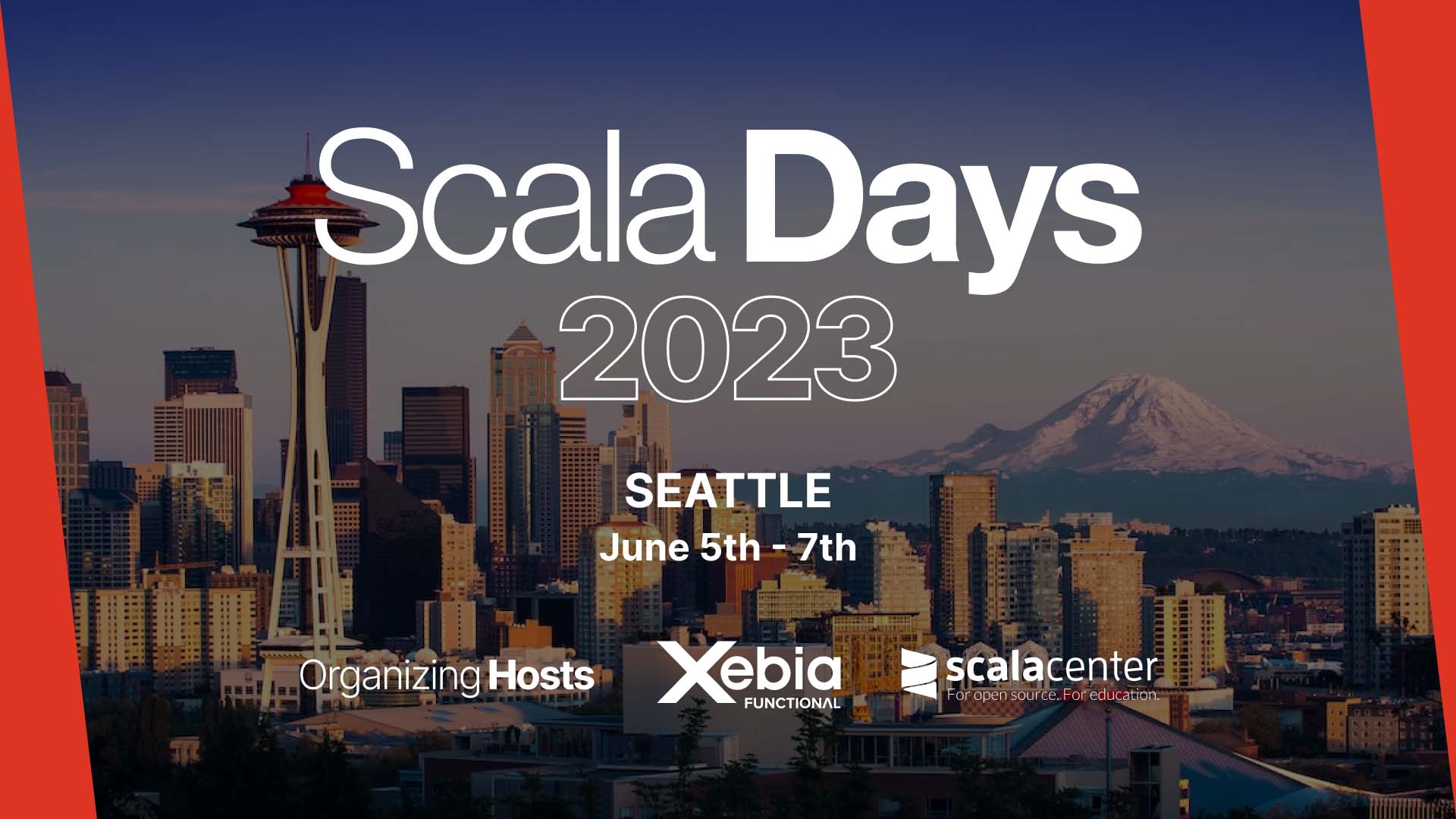At Scala Days, you can explore the latest technology updates, interact with companies who use and help to improve Scala, learn new skills from some of the best Scala practitioners, and meet other enthusiastic Scala developers. Scala Days will take place in Seattle for the first time this June. As an organizing host, Xebia Functional has assembled a two-day interactive training course and a three-day conference in cooperation with the Scala Center.

Scala Days Seattle has a phenomenal lineup of speakers and state-of-the-art topics you won’t want to miss! Presenters will all be in-person, in Seattle, and include top experts from across industries. Take a look:
Adam Fitzgerald and Gjeta Gjyshinca will show how the Optimus Cirrus platform can automatically cache and parallelize tasks across thousands of compute nodes comprising over a petabyte of RAM, and used in daily production to support a significant part of Morgan Stanley’s business.
Learn the underlying problems of async, how async/await works, and why it’s a compelling technique with Adam Rosien of Inner Product.
Maximize the productivity of your day-to-day workflow with ducktape and Aleksander Rainko from Scalac.
Learn how to start a regular event for your project’s contributors and community with Anatolii Kmetiuk, who shares how the Scala Center did this for two years with the Scala Compiler.
Anthony Cros introduces his project, Gallia: a schema-aware data transformation library that enables coders to write practical transformations that domain experts can still comprehend and use one paradigm to process small and large data, without leaving the comfort of their GPL.
August Nagro introduces Magnum, a new Scala 3 library combining aspects of object-oriented repositories, functional DSLs, and SQL String interpolators.
AI has begun transforming how people develop software, and Scala is no exception. Bill Venners of Artima Inc. will look at the promise that AI holds for software development, discuss the limits of the technology, and explore how AI may change the way Scala programs are written in the future.
Daniel Spiewak from the Walt Disney Company will show how to and when not to think about micro-optimization to gain a deeper understanding of the JVM itself.
Databrick’s Denny Lee and Ginger Holt will highlight how simple it is to connect to Spark using Spark Connect from any data applications or IDEs, and how they built the Scala client for Spark Connect that integrates with the server to attempt to solve one of Spark’s hardest problems.
Take a deep dive into polymorphic function types with Guillaume Martres from EPFL to learn how to define functions with type parameters, how to use them, and recent improvements.
Explore how the com.lihaoyi ecosystem started over a decade ago with Haoyi Li. See how it has grown over time, differs from other Scala ecosystems, its core principles, some unusual implementation techniques, and some major failures.
Jack Viers will show how to develop a compiler plugin in Scala 3, including compiler basics, embedding the compiler in test frameworks, snapshot testing to prevent regressions, and the release of compiler testing tools used to develop compiler plugins at Xebia Functional.
Although Scala 3 uses the same incremental compiler as Scala 2, Scala Center’s Jamie Thompson will show how it supports all the new Scala 3 speakers and how you can use it to improve build times.
VirtusLab’s Krzysztof Romanowski will explore how less can be more in the land of Scala tooling with Scala CLI.
Look into a journey from 7 years of Scala development to managing people with Maria Livia Chiorean from Expedia.
Mark Hammons introduces Slinc, an interoperability library for Scala to C that leverages the power of Scala 3’s type system and Java 17’s panama preview to enable a new form of native interop that’s platform independent.
Michael Perucca Will explain how Scala 3’s new features, such as union and match types, enable a composable constraint system supporting the full breadth of Boolean algebra.
Explore why modern Scala is the best language for scripting and automatization with Paweł Marks of VirtusLab.
Xebia Functional’s Rafa Paradela will reflect on what has been learned during the years-long monolith vs. microservices debate within the Scala perspective.
Rory Graves from the Trade Desk will create graphs of more than one billion nodes and terabytes of data to discuss the fun engineering challenges this poses and how to solve them.
Dissect an implementation of a database written entirely in Scala, compiled for the browser using Scala.js with Ryan Peters from Xebia Functional.
VirtusLab’s Szymon Rodziewicz will attempt to explore how the brain comprehends code using Scala Toolkit, a new initiative by Scala Center and VirtusLab designed from the cognitive perspective.
Tomasz Godzik from VirtusLab will talk about the easiest ways of starting with Scala, ways to teach the language, and how it has improved over the years.
Zainab Ali of Dusk Impression will explore effects, concurrency and streams, and build a mental model of stream evaluation to show that functional streams (while complex) are not as murky as they seem.
Scala Days Seattle takes place June 4th to 7th at the Bell Harbor International Conference Center on Pier 66 in the heart of Seattle, Washington in the United States. Book your tickets for Scala Days Seattle today.
As an organizing sponsor, Xebia is proud to have companies like Signify Technology, Databricks, Sourcegraph, YoppWorks, Kalix by Lightbend, and Expedia as sponsors of this incredible community event.
If you can’t make it to Seattle, that’s ok! Scala Days Madrid will take place from September 11th to 14th. Explore Madrid’s speakers, conference location, and training courses on the Scala Days Madrid website.





